If your baby takes a bottle every few hours, your baby is snacking. Cluster feeding is more than just feeding every two hours.
A cluster-feeding baby will eat for short periods before unlatching, fussing, then eating, maybe hiccupping or burping.
By: Suzanne Renee' - Updated February 29, 2024 - 8 Minute Read
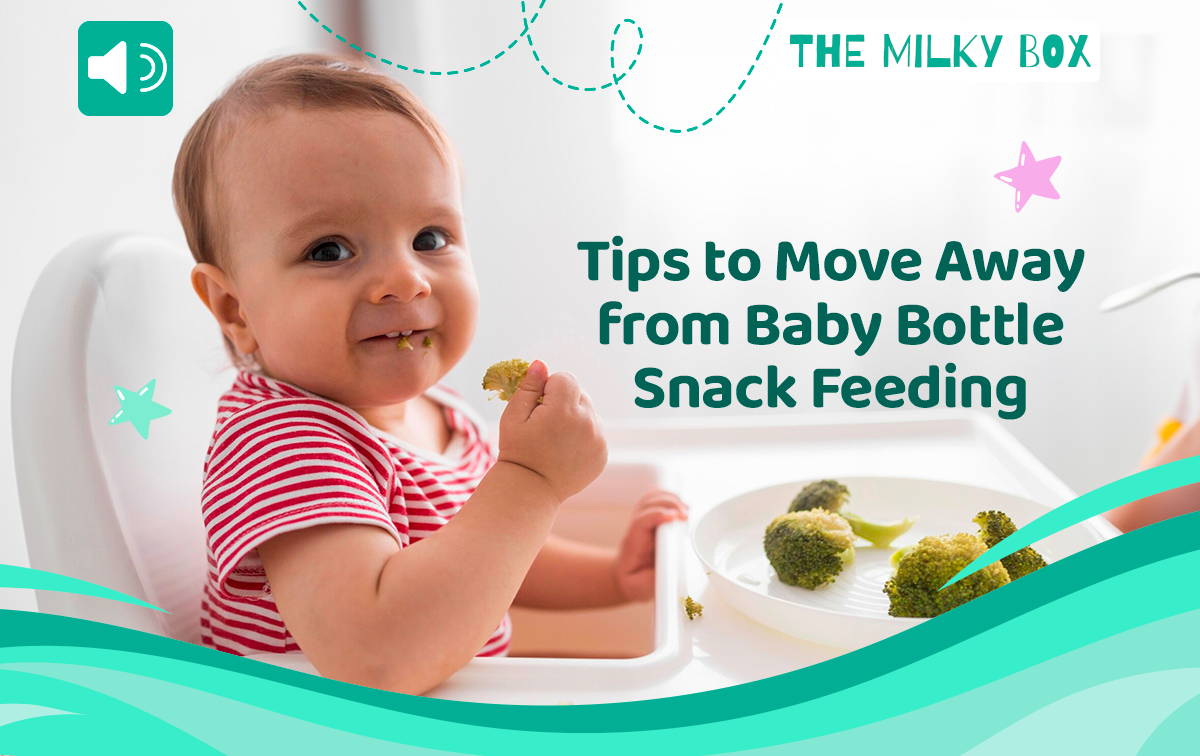
If your newborn doesn't go at least 2 to 3 hours between feedings, they may end up snacking all day instead of getting full. Snack feeding, also called grazing, refers to small, frequent bottles. While this may be okay, it can be time-consuming, exhausting, and expensive for families.
This article will examine snacking as a feeding pattern and explore what can be done to benefit babies and caregivers.
Table of Contents:
1. What is Snack Feeding?
2. Reasons for Snack Feeding
4. Promote Healthy Sleep Habits
5. Find What Soothes Your Baby
6. Get Your Baby in a Sleep Routine
8. Teach Your Baby to Fall Asleep Without Eating
9. Making Bottle Feeding Easier for Your Baby
10. Encourage Your Baby to Drink Up
11. Frequently Asked Questions
Some babies develop a feeding pattern where they nibble every hour or two during the day because they do not take enough calories to sustain them for extended periods.
It is important to note that snack feeding does not mean that the baby is incapable of finishing a bottle; they simply find it easier to take less, leading to the need to feed often.
Snack feeding differs from underfeeding in that the baby consumes enough formula over 24 hours to maintain healthy growth. If your baby is not gaining sufficient weight, please consult your pediatrician for the best course.
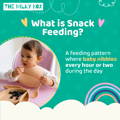
There are four primary reasons that snack feeding in bottle-fed babies usually occurs. All of them are related to infant reflexes and behavioral cues mistaken as signs of hunger.
A tired baby can become too weary to finish eating. If your baby goes to sleep during a meal, put the baby over your shoulder, rub their back, and stroke their head, legs, and tummy.
It is not necessary to wake most older newborns up to eat. However, infants younger than 1-month-old or so may not stay awake to complete a feeding.
During bottle feeding, you can gently brush the side of your baby’s cheek or put the baby over your shoulder, rub their back, and stroke their head, legs, and tummy. These simple, tried, and true movements can help to wake your baby up and complete the feeding.
When babies develop a feeding-sleep association, they learn to rely on a bottle for slumber. An infant then wants to eat when hungry and may not stay awake to finish a whole bottle.
This cycle will allow your little one to take in less than needed for a restful sleep period and wake up more often than developmental required.
It is challenging at the best of times to feed a hungry baby. Still, an overstimulated little one can lead to inconsolable crying and a baby that will have difficulty finishing a bottle of baby formula.
If you have not found the perfect baby bottle, this may cause your little one to work harder than needed, causing fatigue.
Little things matter. If the baby bottle ring is screwed on too tightly or the nipple size is incorrect little muscles struggle, and infants can easily make your little one tired, and they will give up before being satisfied.
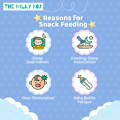
If your baby is healthy and steadily gaining weight, there is no need to change your current feeding schedule. As long as there are no issues or concerns with your baby's feeding pattern, you can continue as you are. Making any unnecessary changes to the feeding routine can be avoided in such cases.
However, if you feel your baby is ready to move away from frequent feedings, there are ways to make the transition easier. For instance, depending on your baby's age and feeding habits, you can gradually increase the time between feedings by a few minutes or even an hour. You can also offer more milk or solid food during each feeding session so your baby stays satisfied for extended periods.
It is important to note that every baby is unique, and what works for one may not work for another. Therefore, observing your baby's behavior and feeding patterns closely and seeking professional advice if you have any concerns or questions is essential. If your baby is healthy and thriving and the feeding schedule is not bothersome, there is no need to change anything. However, families ready to transition away from frequent feedings have options to make the process easier.
Enabling your baby to get the amount of sleep needed for proper growth and development will ensure a healthy appetite when your infant is awake.
Naps are beneficial for your baby, as they help allow tiny bodies to prepare for healthy growth and development.
Avoid overstimulating your little one before winding down, as this can interfere with falling asleep. Look for your baby’s signs that they are getting tired. Yawning, getting fussy, or rubbing their eyes are all good indications.
Babies are soothed in many ways, each as unique as the infant. You can find the best soothe technique for your little one through a little trial and error.
Most babies need help falling asleep. The key here is not to let the bedtime bottle be the answer to nap or nighttime habits.
Consistency with a sleep routine can signal that it is time to rest. A bedtime and naptime routine should be more than calming, and, for the most part, this routine should also take place in the area where your baby sleeps.
As your child matures, keeping to a similar bedtime routine can be helpful. Too much excitement and stimulation just before bedtime can wake your child up again.
Spend some time winding down and doing calmer activities, like rocking, reading, or singing.
Until your baby is a year old, it is recommended that an infant is placed on their back to sleep when in their bassinet or crib.
The most effective action that parents and caregivers can take to reduce their baby's risk of sudden infant death syndrome (SIDS) and other sleep-related death is to always place baby on their back to sleep for naps and at night.
Infants should sleep on a firm, flat surface. Keep this consistent for all sleep periods, ensuring the sleeping area meets all safety standards.
Feed your baby when he first wakes up from sleep and again a bit later if they are awake and still hungry. When your little one shows tired cues, start using soothing techniques such as walking or rocking him instead of offering a bottle.
It may take a little time to eliminate unhealthy habits that will allow falling asleep without sucking. Overall, this will be better for both you and the baby.
Formula that mimics breast milk in taste and nutrition is a sure way to ensure your little one finishes each bottle.
After preparing the perfect bottle of baby formula, encourage your baby to take as much milk as possible within 45 minutes. Your baby will show sure signs if they are full or no longer interested in feeding. Do not try to make your baby eat more than their little digestive system can manage.
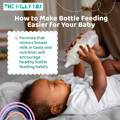
Once your baby is between four months and six months old, they are ready for a more consistent feeding schedule. A bottle-fed baby will usually settle into a routine of feeding, napping, and prolonged sleep periods.
Unlike the newborn stage, your baby will likely eat every four hours, between 6-8 ounces per feeding. You can also multiply your baby’s weight by 2.5 and divide by the number of bottles per day to get an approximate amount (14 lb. baby x 2.5/5 feedings per day =7 ounces per feeding).
Of course, your baby’s growth, development, and calorie needs will vary greatly, but this idea will help along the way. It is common for little ones over four months to nap three times a day, eat five times daily, and cluster feed before bed to store energy for a longer resting period.
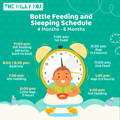
The healthiest bottle-feeding habits start with the best ingredients that have been sourced in an ecologically responsible way.
The Milky Box carries infant nutrition from birth through toddler years, made without added sugars, soy, or toxic ingredients—only the best European formula to support physical growth and cognitive development.
Is My Baby Snacking or Cluster Feeding?
If your baby takes a bottle every few hours, your baby is snacking. Cluster feeding is more than just feeding every two hours.
A cluster-feeding baby will eat for short periods before unlatching, fussing, then eating, maybe hiccupping or burping.
Why Does My Baby Keep Snacking the Bottle?
Snack feeding in bottle-fed babies usually occurs because infant reflexes are mistaken as signs of hunger.
Is Snack Feeding Normal for Babies?
Yes, frequent feeds are expected for breastfeeding and bottle-fed babies. Unfortunately, it can be time-consuming, frustrating, and costly for families.
Disclaimer:
Please be aware that this information is based on general trends in babies, and it is not medical advice. Your doctor should be your first source of information and advice when considering any changes to your child’s formula and when choosing your child’s formula. Always consult your pediatrician before making any decisions about your child’s diet or if you notice any changes in your child.
Breastfeeding is the best nutrition for your baby because breast milk provides your child with all the essential nutrients they need for growth and development. Please consult your pediatrician if your child requires supplemental feeding.

Suzanne Renee' is an accomplished professional with extensive expertise in the area of infant nutrition, dedicated to promoting the health and wellbeing of children. She started this journey as a foster parent. Suzanne has emerged as a strong proponent of the European baby formula and has become a full time writer of the subject. In her free time, she enjoys camping, hiking and going to church.
Reviewed by Dr. Eric Wood, ND, MA

Dr. Wood is a licensed naturopathic doctor, with a doctorate degree from the Canadian College of Naturopathic Medicine in Toronto, Canada. He received his post-graduation certification in Mind Body Medicine at Harvard University.
With 15 years of experience, Dr. Wood is an Associate Professor of Holistic Nutrition at the American College of Health Sciences in Portland, Oregon. Dr. Wood is an educator, clinician, author, media figure, consultant, and owns his own holistic (naturopathic) medical practice in Ft. Lauderdale, Florida. Dr. Wood is currently researching and drafting books on cancer and pediatrics.
Outside of the medical profession, Dr. Wood loves singing with the Miami Lyric Opera and is an avid musician in South Florida. He also loves spending time with his wife and kids.